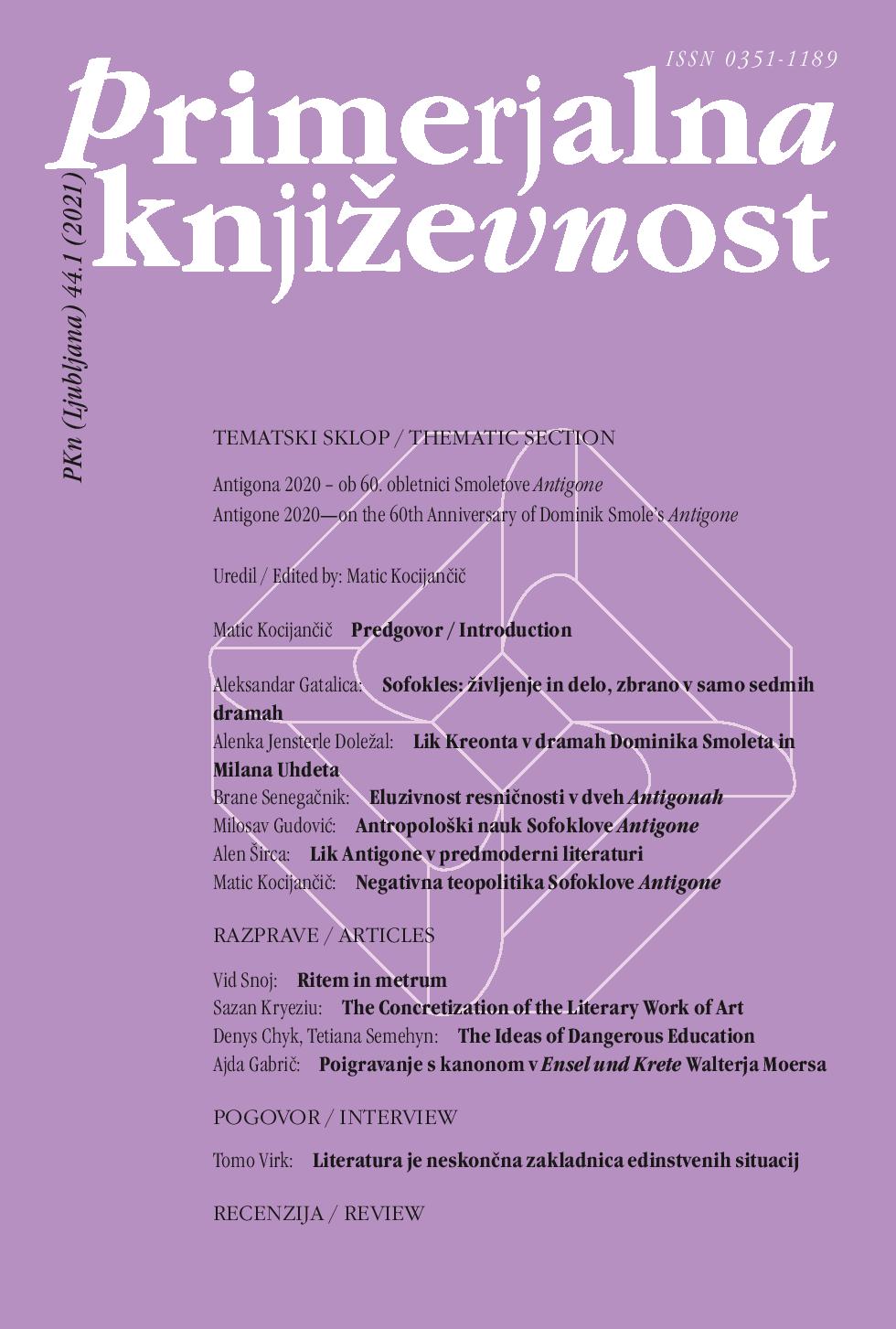Rhythm and Metre
DOI:
https://doi.org/10.3986/pkn.v44.i1.07Keywords:
ancient Greek poetics, European poetry, versification, metre, rhythmAbstract
The starting point of the paper is the Greek understanding of poetry, which became the norm in antiquity and has maintained such a status well into post-antiquity. According to this understanding, poetizing is a measuring or a putting of words into a measure (Gr. metron), while poetry is an art of metrical speech binding and thus of versification. The rhythm in Greco-Roman poetry seems to have been captured in a measure that was a quantitative measure, the duration of syllables. But already in ancient metrics rhythm began to separate from meter, although it remained subordinate to it as a systemic structure. When in late antiquity the distinction between long and short syllables, on which the quantitative system of versification was based, became inaudible, the liberation from the meter began under the sign of rhythm. “Rhythm” in Middle Ages described the structure of poems in the vulgar languages of post-antique Europe and established itself in the Renaissance as the primary term for the syllable versification system. However, the imitation of the meter continued in European poetry, with demetrification and remetrification alternating. Therefore, modern versiology illustrates the development of European versification with the movement of sea waves, which is not equable as in nature: the meter is in decline, while the rhythm is steadily increasing. In the picture it paints, the final liberation of rhythm from the meter is represented by the free verse. Nonetheless, at the end the paper returns to the beginning with the warning that rhythmos originally did not refer to something audible, but to the mostly visible momentary form of something unstable. On this basis it finally tries to define what a poetic rhythm is.
References
Aristotle. <em>Poetics</em> / Longinus. <em>On the Sublime</em> / Demetrius. <em>On Style</em>. Grški izvirniki z angleškim prevodom. Cambridge, MA: Harvard University Press, 2015 (Loeb 199).
Attridge, Derek. <em>Poetic Rhythm. An Introduction</em>. Cambridge: Cambridge University Press, 1996.
Averincev, Sergej. <em>Poetika zgodnjebizantinske literature</em>. Prevedel Pavle Rak v sodelovanju z Matejo Komel Snoj. Ljubljana: KUD Logos, 2005.
Beda Častitljivi. <em>De arte metrica. Venerabilis Bedae, Anglo-saxonis presbyteri, opera omnia</em>. Zv. 1. Izd. Jacques-Paul Migne in fratres Garnier, Pariz 1904 (PL 90). 149–175.
Benveniste, Émile. <em>Problemi splošne lingvistike I</em>. Prevedla Igor Žagar in Bernard Nežmah. Ljubljana: Založba ŠKUC in Znanstveni inštitut Filozofske fakultete, 1988.
Cicero. <em>Brutus</em> / <em>Orator</em>. Latinski izvirnik z angleškim prevodom. Cambridge, MA: Harvard University Press, 2014 (Loeb 342).
Diels, Hermann, in Walther Kranz. <em>Fragmenti predsokratikov</em>. 3 zv. Izd. Gorazd Kocijančič. Prevedli Dašo Benko idr. Ljubljana: Študentska založba, 2012.
Dionysius of Halicarnassus. <em>Critical Essays I. On Literary Composition</em>. Grški izvirnik z angleškim prevodom. Cambridge, MA: Harvard University Press, 2007 (Loeb 466).
Gasparov, Mihail Leonovič. <em>Očerk istorii evropejskogo stiha</em>. Moskva: Fortuna Limited, 2003 (2., dopolnjena izdaja).
Georgiades, Thrasybulos. <em>Der griechische Rhythmus. Musik, Reigen, Vers und Sprache</em>. Hamburg: Marion von Schröder Verlag, 1949.
Halliwell, Stephen. <em>Aristotle’s Poetics</em>. London: Duckworth, 1998 (2. izd.).
Hegel, Georg W. F. <em>Vorlesungen über die Ästhetik I–III. Werke</em>. Zv. 13–15. Izd. Eva Moldenhauer in Karl Markus Michel. Frankfurt na Majni: Suhrkamp, 1994 (4. izdaja).
Hengel, Martin. <em>Judentum und Hellenismus. Studien zu ihrer Begegnung unter besonderer Berücksichtigung Palästinas bis zur Mitte des 2. Jahrhunderts v. Chr</em>. Tübingen: J. C. B. Mohr (Paul Siebeck), 1969.
Hieronim. »Praefatio s. Hieronymi in librum Job«. <em>Sancti Eusebii Hieronymi Stridonensis presbyteri opera omnia</em>. Zv. 9. Izd. Jacques-Paul Migne in fratres Garnier, Pariz 1890 (PL 28). 1138–1142.
Homer. <em>Odiseja</em>. Prevedel Anton Sovrè. Ljubljana: Založba Mihelač, 1991.
Horace. <em>Odes and Epodes</em>. Grški izvirnik z angleškim prevodom. Cambridge, MA: Harvard University Press, 2015 (Loeb 33).
Kugel, James L. <em>The Idea of Biblical Poetry. Parallelism and Its History</em>. Baltimore, London: The Johns Hopkins University Press, 1998.
Kvintilijan, Mark Fabij. <em>Šola govorništva</em>. Prevedel Matjaž Babič. Ljubljana: Zupančič&Zupančič, 2015.
Meillet, Antoine. <em>Les origines indo-européennes des mètres grecs</em>. Pariz: Presses Univ. de France, 1923.
Opitz, Martin. <em>Buch von der deutschen Poeterey (1624)</em>. Izd. Richard Alewyn. Tübingen: Niemeyer, 1963.
Plato. <em>Lysis</em> / <em>Symposium</em> / <em>Gorgias</em>. Grški izvirnik z angleškim prevodom. Cambridge, MA: Harvard University Press, 2015 (Loeb 166).
Platon. <em>Simpozij. Zbrana dela</em>. Zv. 1. Prevedel Gorazd Kocijančič. Celje: Mohorjeva družba, 2004. 74–91.
Platon. <em>Fileb. Zbrana dela</em>. Zv. 1. Prevedel Gorazd Kocijančič. Celje: Mohorjeva družba, 2004. 434–485.
Pound, Ezra. <em>ABC of Reading</em>. London, Boston: Faber and Faber, 1991.
Quintilianus, Marcus Fabius. <em>The Orator’s Education</em>. Latinski izvirnik z angleškim prevodom. Cambridge, MA: Harvard University Press, 2014 (Loeb 124–127).
<em>Sveto pismo stare in nove zaveze. Slovenski standardni prevod iz izvirnih jezikov</em>. Ljubljana: Svetopisemska družba Slovenije, 1997 (2., pregledana izdaja).
West, Martin L. <em>Greek Metre</em>. Oxford: Clarendon Press, 1982.
von Wilamowitz-Moellendorff, Ulrich. <em>Griechische Verskunst</em>. Berlin: Weidmannsche Buchhandlung, 1921.
Župančič, Oton. »Ritem in metrum«. <em>Ljubljanski zvon</em> 37.5 (1917): 277–279.


